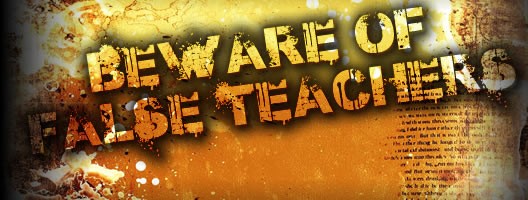
I have suggested that there is no such thing as a heretic in the traditional sense of the word. Heresy is Divisiveness, and it was only to gain more power that the charge of heresy began to get thrown around.
So where does this leave us? Are we then free to believe whatever we want? Am I endorsing a theological free-for-all?
Of course not. Beliefs still matter.
While there is no such things as a “heretic” in the traditional sense, there are “false teachers.” We must be able to recognize teaching when it is false, and avoid it.
False Teachers
The problem, however, is that false teaching is usually must closer to us than we ever imagine. In the next several posts, we will look at false teachers, how to recognize them, and what we are to do about them.
But first, let me ask a question. If you were to guess how many verses in the Bible warn against false teachers, what would you say? It is quite common nowadays to hear pastors and authors warn their church against false teachers. With how much it is talked about in our pulpits and written about in out books, one would think that warning against false teachers is a popular topic in Scripture. So what would you guess? 10 times? 50? Maybe 100?
You may be surprised to learn that the Bible only talks about “false teachers” one time. Once. Only one verse in the Bible warns about false teachers. Which one? The single reference is the verse we have just looked at, 2 Peter 2:1. Now certainly, the concept of false teaching and unsound doctrine is found elsewhere in Scripture, and the term “false prophets” which is also found in 2 Peter 2:1 is also found in other passages, but the disparaging label of “false teacher” which is so frequently tossed about these days, is not a common term in Scripture.
Since this is so, why do we the label so frequently today? Why is it that whenever someone disagrees with our theology and our doctrine, we are so quick to condemn them as a “false teacher”?
The Charge of False Teacher
 The primary reason, I am convinced, is the same reason we like to label people as heretics. Such labels allow us to avoid considering the ideas of others, and if we are in a position of leadership, allows us to maintain some control and power over those who look to us for spiritual guidance.
The primary reason, I am convinced, is the same reason we like to label people as heretics. Such labels allow us to avoid considering the ideas of others, and if we are in a position of leadership, allows us to maintain some control and power over those who look to us for spiritual guidance.
It is far easier to call someone a “heretic” or a “false teacher” then it is to actually learn and understand the views of those who disagree, and then either lovingly state our disagreements or adjust our own views to fit with something we learned from someone else.
It is always easier to continue believing what we already believe, and condemn everyone else, then it is to take the risk of having our views and ideas challenged by someone else.
It is always easier to dismiss someone out of hand, then it is to consider their views.
So what then does Peter do when he charges someone as a false teacher? We’ll begin to look at 2 Peter 2:1 tomorrow.




Consider – If God required us all to believe exactly a certain way on everything would He not have given us something much less open to various interpretations than what we have?
It is easy to focus on our differences rather than what we have in common – a faith in a risen Jesus. Because we disagree on the proper method of baptism, the role of women in the church or the proper interpretation of a certain Biblical passage does not make one of us correct and the other a “false teacher”.
That is not to say that some are not in the regular habit of spouting nonsense. Unfortunately I doubt they will listen to our great wisdom in setting them straight. The only one capable of such a feat would be the Holy Spirit.
Sam,
Great point. If God wanted us to have a list of doctrines that we must believe, He gave us the wrong sort of book from which to get them. It seems a terrible oversight on His part to give us a book which can be so confusing and subject to so many various interpretations.
Hmm…perhaps because He knew if He did that, we would turn it into ritual and abandon the pursuit of relationship?
Bingo!
Double Bingo!
Jesus never left us a book he left us people in charge PETER and the church in charge the new testament came later from that church like many other teachings ,the church is still here its called the cathoilc church
Now we get to it Sam, I have just been reading again about Jonathan the loyal one between two kings Saul his dad and David his best mate, you would say buddy over the water. Anyway Jonathan was a prime example of loyalty which sounds like royalty, but has nothing to do with Kings and Queens as loyalty is not high on their agenda, that can also be said for people in high places who lose their sense of direction through their elevation, ending up with their heads in the clouds as did Gods chosen Kings Saul and David.
Jesus is the mark for all of us as we live this short span on earth, in how to live a righteous life.
On the Thursday before Good Friday He left the disciples with no doubt as to how to live. He stripped Himself of his top raiment placed a towel around His waist and washed their smelly, disgusting feet. He said this is how you are to be, loving one another in this way always preferring the other person above yourself.
In England the King used to wash the peoples feet as a symbol of being the peoples servant not a tyrant. In the 18th century the practice stopped, James the 2nd was the the last monarch to do it, it was then past on to the Bishop. I am told the Pope still does it today. In england the Queen gives out Maunday Money on Maunday Thursday.
In the Church I attend, the Church of England we have various levels of authority our top guys, (male, maybe not for long) are called Archbishops, the Arch as in Monarch means the top person the covering a bit like an umbrella which shields us from the elements, the top person is there to shield the people under them, not to lord it over them, thats the devils way.
Jesus is our one and only covering our Arch so to speak. As anyone moves up the ladder we must always remember we are called to that place and its an honor bestowed on us. The resultant attitude should be of humility not pride which causes us to look down instead of up. We become more of a servant as we rise in the ranks.
Jesus also talked about those who get themselves into a higher ranking by stealth ( knock off the th and you see the man) There was a banquet and the master noticed he was not wearing the proper clothes, Friend he said how is it your in here without wedding clothes, he could not answer. He was thrown out into utter darkness where there was weeping and gnashing of teeth. Matthew 22 v 10 to 14.
Today the buzz word is push yourself forward and trample over the rest, it’s the only way to get on. Shake lots of hands kiss lots of babies, lie, cheat everything is legitimate so you can fulfill your purpose and reach your goal. There was another banquet in Luke 14 V 8 to 14 do not exalt yourself, wait. If someone apparently does better than you or has more friends than you or is better looking than you etc don’t envy but be glad for that person, honor them by giving them an extra friend.
Isn’t being a Christian easy? can we do it? not in our own strength we can’t, it’s a continual battle of being accountable to Gods Holy Spirit who gives all we need if we are willing to ask.
A few people in our Church are in accountability groups normally three in the group of the same gender. They have found it tough to share all their thoughts but they all admit they are better people for it and feel God has blessed them. I have two blokes who I see individually and we are totally honest with each other and each week check up on how we are going on. I have been so blessed by both of them. Without the Holy Spirit in us I can’t imagine where we would be now.
Your brother in Christ Clive
Clive,
You are part of the Church of England? Very interesting.
What are your thoughts on the Bishop of Durham, NT Wright?
I am reading his book, Simply Jesus right now. Wow. If this is what Anglicanism holds to, he almost makes me want to become Anglican.
right now. Wow. If this is what Anglicanism holds to, he almost makes me want to become Anglican.